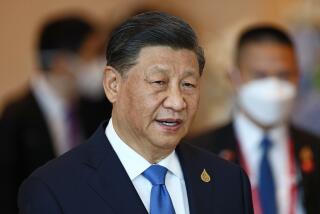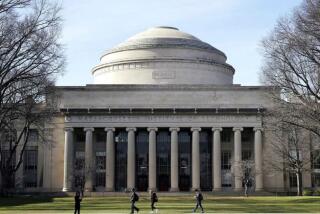China Overhaul of Science Calls for Greater Creativity
- Share via
PEKING — The Chinese Communist Party on Tuesday announced a far-reaching overhaul of the nation’s science system, calling for guarantees of academic freedom and protection of intellectual property rights in an effort to stimulate greater creativity.
In a detailed policy statement approved by the party’s Central Committee, the regime decided to let scientists and engineers sell their technological discoveries, as they do in the West. They will also be allowed to do private consulting work while maintaining their ties to the state-owned research institutes.
China plans to develop an on-line computer retrieval system tied in to systems abroad, and to open more of its advanced institutes to the outside world, the Communist Party said.
In issuing the reform instructions, the party admitted that until now, China has treated its scientists and engineers in ways that have discouraged innovation.
‘Serious Defects’ Cited
“The current science and technology management system, which has evolved over the years, suffers serious defects that hamper the full use of the intelligence and creativity of scientists and engineers,” the Central Committee said.
The Communist Party said it now believes in “opposing egalitarianism. Remuneration, rewards and honors should be closely tied to personal contributions. High awards should be granted for major contributions.
“Truly respecting scientists and engineers means guaranteeing them freedom of academic inquiry and discussion so that they can pursue truth fearlessly,” the party said, adding that it favors open debate and opposes “arbitrary administrative interference in academic freedom.”
In the past, the Chinese Communist Party rejected the entire concept of academic freedom, maintaining that it was a notion devised to protect the bourgeoisie, the ownership class. Party officials argued that in each academic discipline, there could be only two schools--one Marxist and the other non-Marxist.
Over the last few months, however, in a cautious and limited way, the Chinese regime has begun to stress the values of tolerance and academic freedom. Fudan University in Shanghai, one of China’s leading academic institutions, earlier this year sponsored a series of lectures on non-Marxist philosophies.
Su Shaozhi, one of China’s leading Marxist theoreticians, wrote earlier this year that “so long as they do not defy the (Chinese) constitution and the law, all academic questions can be freely discussed.”
Chance to Show Potential
The new Communist Party statement was issued shortly after the end of a nationwide conference of scientists sponsored by the State Council, China’s version of a presidential Cabinet.
In an appearance before the conference, the nation’s top political leader, Deng Xiaoping, said China needs to “create an atmosphere in which top-notch persons can show their true potential.”
The policy statement issued by the Central Committee on Tuesday said that “competent people must no longer be made to sit idle and waste their talent.”
From now on, the Communist Party said, China “will protect the ownership of intellectual property.” The party said the market prices of technological achievements “will be determined through negotiations between the seller and the buyer.”
More to Read
Sign up for Essential California
The most important California stories and recommendations in your inbox every morning.
You may occasionally receive promotional content from the Los Angeles Times.













